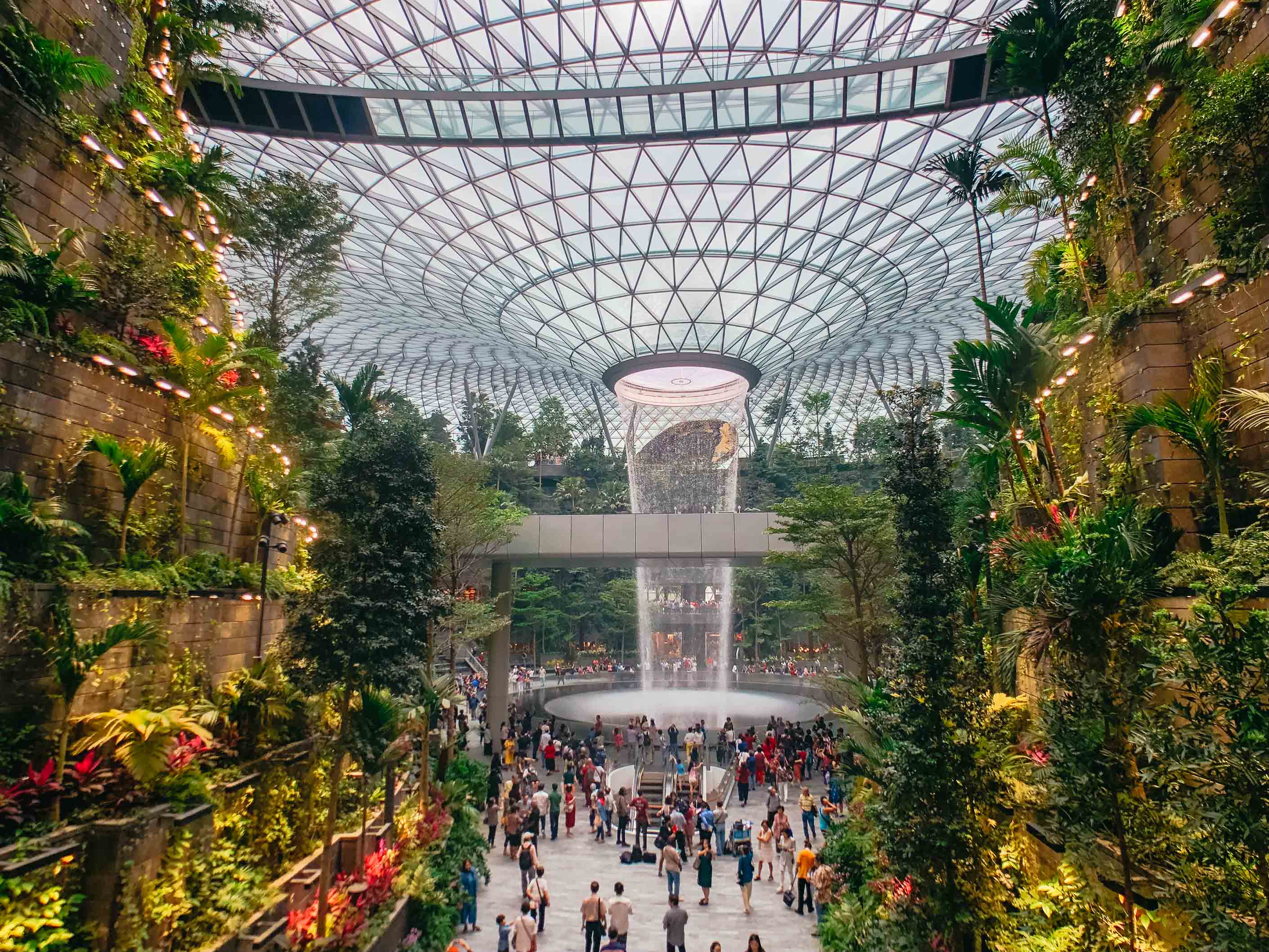
World’s best airport has new $1 billion shopping, entertainment hub with indoor waterfall.
Singapore Changi Airport, ranked the No. 1 airport in the world, is opening to the public a new shopping and entertainment hub called the Jewel, on April 17.
Inspired by Singapore’s reputation as a “city in a garden,” Jewel features a sprawling indoor forest, 280 retail shops and restaurants and the tallest indoor waterfall in the world. The complex cost $1.7 billion SGD, or nearly $1.3 billion US, to build.
Take a look inside:
The centerpiece of Jewel is the Forest Valley, a tropical four-story garden with a large plant collection.
Walking trails lead guest to Canopy Park, a separate section opening in June 2019, which features activities like a 160-feet suspended bridge with glass floor, a bouncing net (to jump up and down on), a walking net (82 feet high above the greenery), a hedge maze, a mirror maze and slides.
In Jewel’s Rain Vortex, another self-contained section, there is the world’s tallest indoor waterfall, which is over 130 feet high. The water cascades from an oculus in the roof. (Previously, nature park Gardens By The Bay, also in Singapore, held the title of world’s tallest indoor waterfall at 115 feet.)
Source: https://www.cnbc.com/2019/04/12/photos-jewel-changi-airport-in-singapore-has-tallest-indoor-waterfall.html
Source: https://www.telegraph.co.uk/travel/destinations/asia/singapore/articles/timelapse-video-worlds-best-airport-changi-singapore/

Le Parisien reported that the main pilots union in France, SNPL, has called off a strike scheduled for May 14-19
Link:
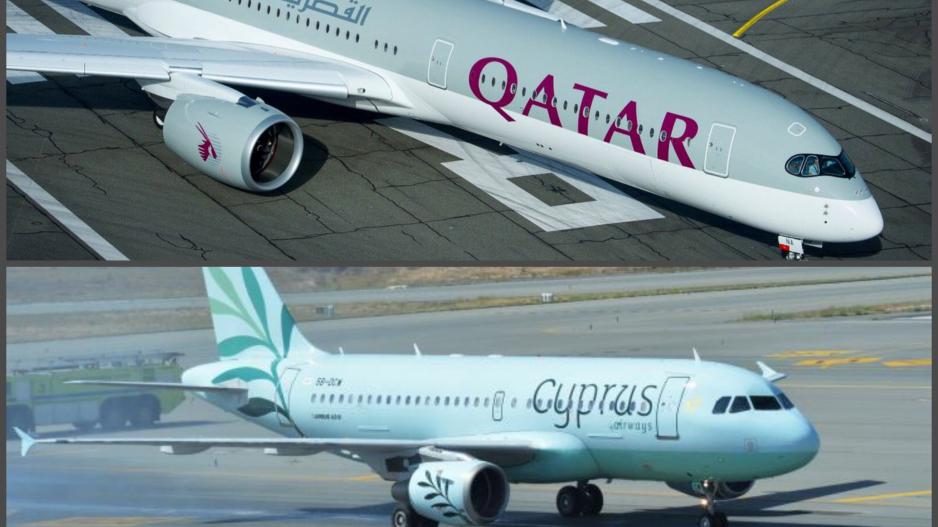
The agreement, which came into effect in November, will enable Qatar Airways’ passengers to travel from Doha to any Cyprus Airways destination via Larnaca.
Similarly, Cyprus Airways’ passengers will be able to continue their journey from Larnaca to Doha and beyond, to more than 150 destinations, across six continents, with Qatar Airways flights.
“We are very excited about this agreement. Our partnership with Qatar Airways is a pillar of Cyprus Airways strategy to diversify services with the aim of offering our passengers more travel opportunities and to establish Cyprus as a hub,” said Natalia Popova, Chief Commercial Officer of Cyprus Airways.
Qatar Airways Group Chief Executive, Akbar Al Baker said: “As one of our key gateways to the Eastern Mediterranean islands, Larnaca is a significant part of the Qatar Airways network.”
“We are delighted to partner with Cyprus Airways to provide a greater choice of travel opportunities to passengers travelling through Doha and Larnaca.”
This latest agreement by the Cypriot-based airline follows a codeshare deal with Romania’s Blue Air for popular flights to London and Greece.
Cyprus Airways recently became a full member of IATA.
“Membership enables the company to collaborate with other international member airlines for codeshare and interline agreements and provide a seamless travel experience through an extended global network to travellers to and from Cyprus,” said Popova.
In July 2016, Charlie Airlines Ltd, a Cyprus registered company, won a tender competition for the right to use the trademark Cyprus Airways for a decade.
The company launched flights in June 2017.
Cyprus Airways operates flights to Europe, Russia and Middle East. All Cyprus Airways flights operate on modern Airbus A319 aircraft with a capacity of 144 Economy Class seats.
A multiple award-winning airline, Qatar Airways was named ‘World’s Best Business Class’ by the 2018 World Airline Awards, managed by international air transport rating organisation Skytrax.
It was also named ‘Best Business Class Seat,’ ‘Best Airline in the Middle East,’ and ‘World’s Best First Class Airline Lounge.’
Qatar Airways was the first Gulf carrier to join global airline alliance, oneworld, enabling its passengers to benefit from more than 1,000 airports in more than 150 countries, with 14,250 daily departures.
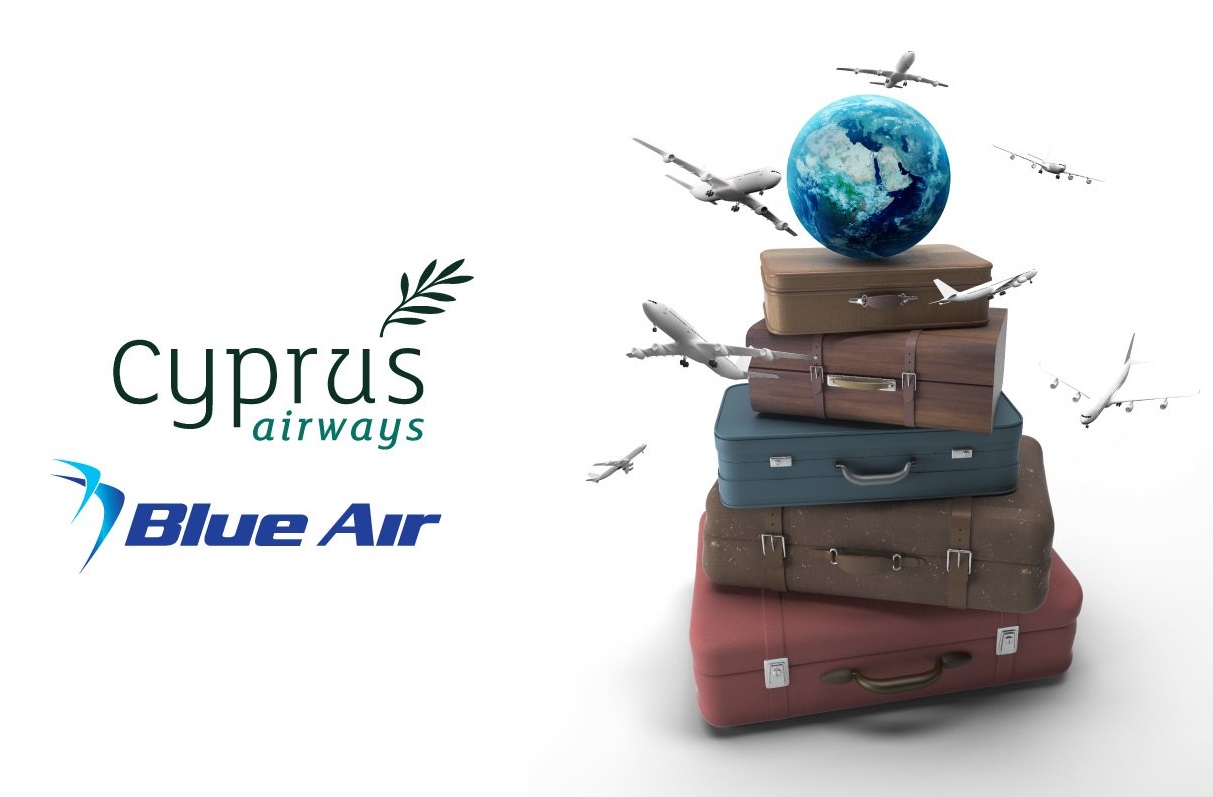
Cyprus Airways and Blue Air have agreed to extend their codeshare partnership, which was launched in December 2018.
More specifically, the collaboration between the two airlines will be extended over the summer schedule, starting on March 31, and until October 26, 2019.
Under this codeshare partnership, the two airlines’ customers will have an enhanced connectivity from Larnaca to Athens, Thessaloniki and Heraklion, Crete.
“Our cooperation with Blue Air proved to satisfy our travelers’ needs… The codeshare agreement with Blue Air will give our customers more opportunities and flexibility to choose from when booking their flights to Greece”, said Natalia Popova, Chief Commercial Officer of Cyprus Airways.
Blue Air has nine bases in Cyprus (Larnaca), Romania (Bucharest, Bacau, Cluj-Napoca, Constanta, Iasi), Italy (Turin, Alghero) and the United Kingdom (Liverpool).
Link: https://news.gtp.gr/2018/11/29/cyprus-airways-blue-air-launch-codeshare-partnership/
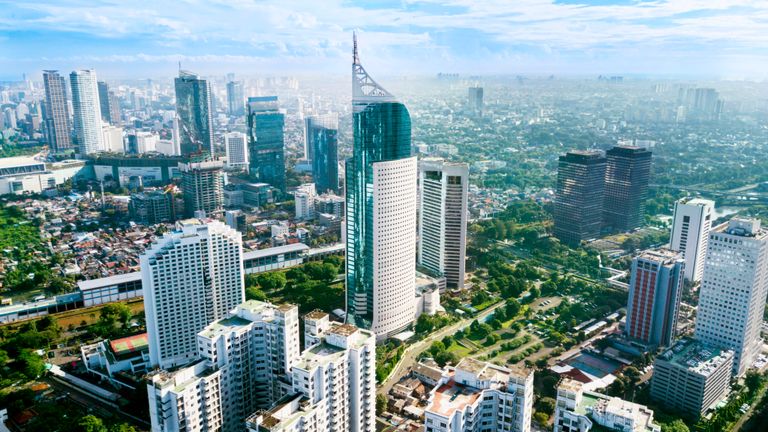
Indonesia plans to relocate its capital from Jakarta because it’s one of the fastest-sinking cities in the world.
Source: https://edition.cnn.com/2019/04/29/asia/indonesia-relocate-jakarta-intl/index.html
or
https://www.news.com.au/travel/travel-updates/indonesia-plans-to-move-its-capital-away-from-jakarta/news-story/b6a43e1f4dcf8c1bcfd412c9ab1a1683
or
https://news.sky.com/story/indonesia-to-move-capital-away-from-jakarta-11706822
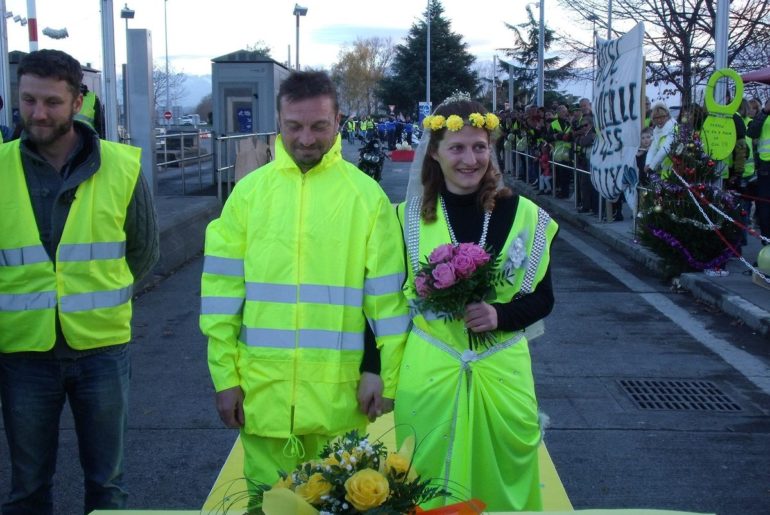
1:38pm, 30 April 2019: Latest update: Summary – Large-scale protests linked to the yellow vest movement (as well as other political groups and trade unions) are expected to take place on Wednesday 1 May in Paris and in other cities across France (1 May is a public holiday in France); as with previous demonstrations, these may lead to violence.
Source: https://www.gov.uk/foreign-travel-advice/france?utm_source=e8de12d5-6e41-4a14-966e-3b21bc172b90&utm_medium=email&utm_campaign=govuk-notifications&utm_content=immediate
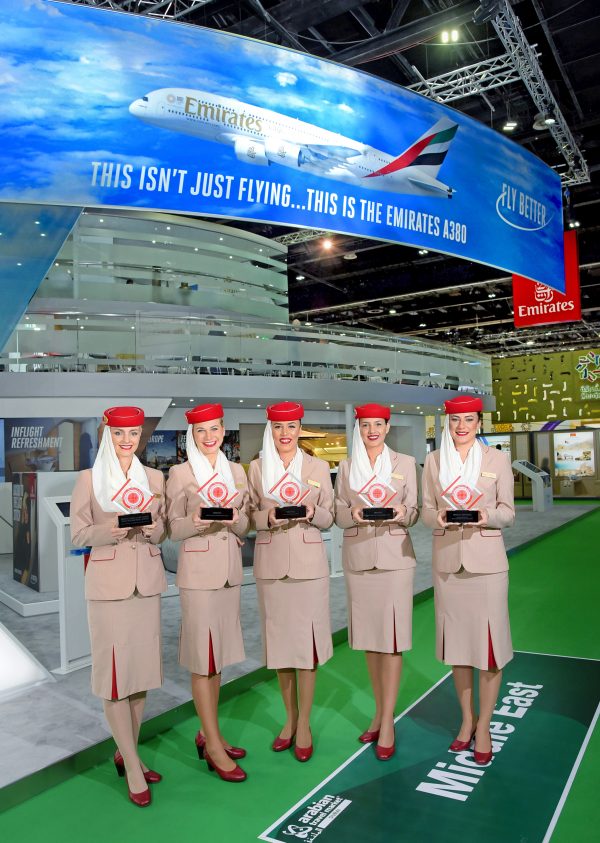
Emirates named Best Airline Worldwide, sweeps up five awards at Business Traveller Middle East Awards 2019
The airline was also crowned Airline with the Best First Class, Airline with the Best Economy Class, Airline with the Best Frequent Flyer Program and Best Airport Lounge in the Middle East
Dubai, UAE: 29 April 2019 – Emirates continued its winning streak when it took top honours by sweeping five awards last night at the Business Traveller Middle East Awards 2019. The airline took home the highly regarded industry accolades for Airline with the Best First Class, Airline with the Best Economy Class, Airline with the Best Frequent Flyer Program and Best Airport Lounge in the Middle East. Recognised for its operational excellence and exceptional products and services – the world’s largest international airline also took home the coveted award of Best Airline Worldwide.
Link: https://www.emirates.com/media-centre/emirates-named-best-airline-worldwide-sweeps-up-five-awards-at-business-traveller-middle-east-awards-2019
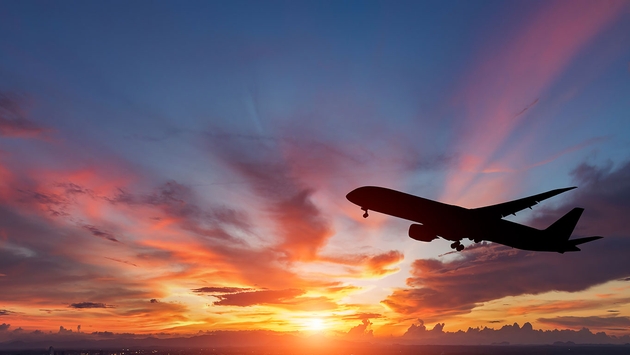
April 17th 2019
Experts believe the recent grounding of the troubled Boeing 737 Max along with other factors has the potential to drive fares up during the busy summer travel period.
CNN Business reports that last month’s temporary grounding took more than 370 jets out of service worldwide and halted the delivery of some new jets that would have otherwise been in operation by summertime, airlines’ peak travel season.
Low-cost carriers such as Southwest Airlines are among the 737 Max’s largest customers and fewer flights operated by discount airlines could result in less incentive for other carriers to offer lower prices.
“I think it certainly has the ability to pressure fares higher as we get into the busy summer months,” Helane Becker, an airline analyst for Cowen, told CNN.
“All the airlines have some extra planes at any period of time. But in the summer the system is strained more tightly,” added Philip Baggaley, the lead credit analyst for transportation companies for Standard & Poor’s. “It’s tough to disentangle the impact of the 737 Max from the other factors.”
A robust U.S. economy and low unemployment also mean increased demand for summer travel. What’s more, higher jet fuel prices—which are roughly 20 percent above where they were at this point a year ago, according to CNN—limit routes thus limiting passengers’ choices and keeping fares from falling.
Meanwhile, in Europe, the recent collapse of some budget airlines such as Wow Air has reduced competition, likely allowing fares to rise into the busy summer travel period.
Link: https://www.travelpulse.com/news/airlines/airlines-expected-to-raise-fares-this-summer.html
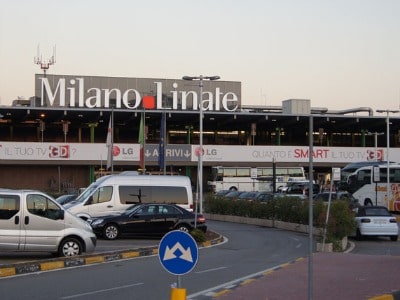
AIRPORT – Milan Linate Airport – Milan Linate airport is to close from July 27 until Oct 27, 2019, to allow for renovation works. Majority flights to be re-routed to Milan Malpensa Airport.
Link: https://www.businesstraveller.com/business-travel/2018/10/01/milan-linate-airport-to-close-for-renovations-over-summer-2019/
STRIKE – Milan – Some airport personnel in Milan Airports will strike for 24 hours, from 00:00 to 23:59, April 13. Check with your ticket office whether this affects your flight Details.
Link: https://www.summerinitaly.com/traveltips/transport-strikes-in-italy
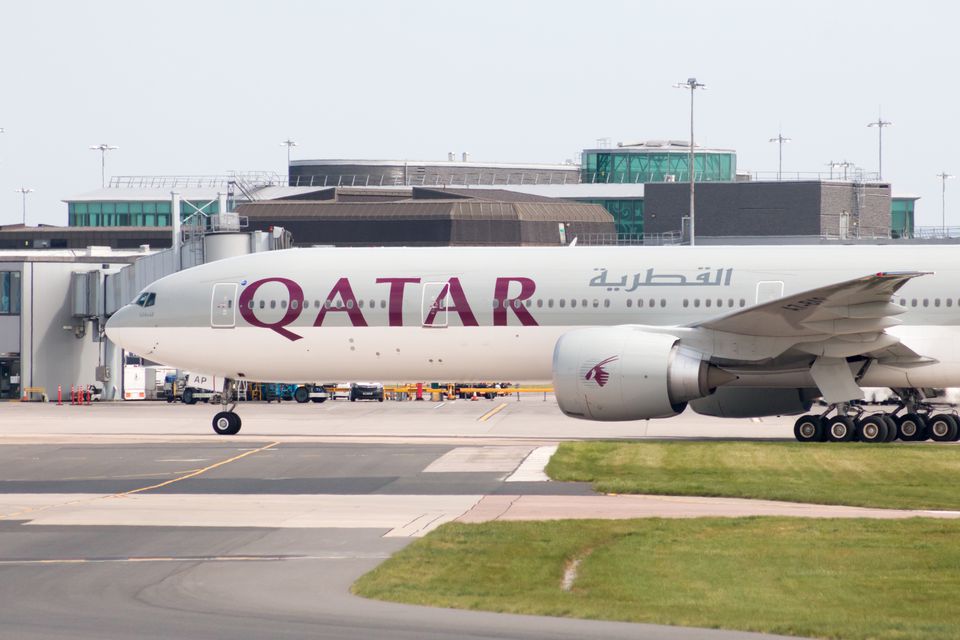
Qatar Airways to Sudan
FLIGHT DELAY – Due to commercial reasons, all Qatar Airways flights to/from Khartoum, Sudan will be temporarily suspended effective March 31 until further notice.
Link: https://thepeninsulaqatar.com/article/14/03/2019/Qatar-Airways-to-suspend-Sudan-flights
